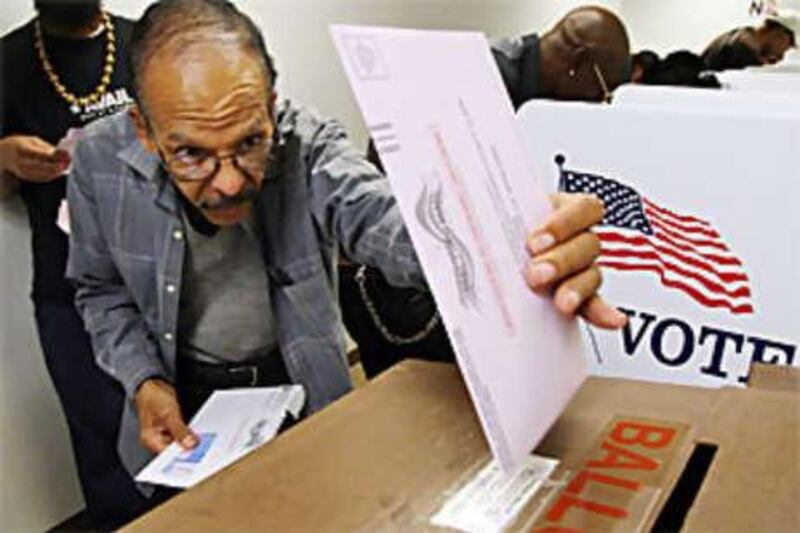The significance of Barack Obama's victory cannot be overstated. Besides the obvious fact of being the first African-American elected to the office, there are several other metrics that help define the importance of his win. Since 1980, when the so-called "Reagan Revolution" swept conservative Republicans into power, it has been said that Democrats were in retreat. In the 28 years that followed Reagan's win only one Democrat (Bill Clinton) was elected president and many believe his initial victory was largely due to the presence on the ballot of a third-party candidate, Ross Perot. (Mr Perot garnered 19 per cent of the vote.)
After George W Bush won re-election in 2004 some Republicans, most notably Karl Rove, crowed that there was a realignment under way in US politics that would result in long-term Republican control. That was 2004. Four years later, Mr Rove's "realignment vision" has been shattered by a combination of factors.
The failures of the Bush administration were, first and foremost, the reasons behind the Republicans' undoing. The combination of its disastrous performance in the aftermath of Hurricane Katrina and the unravelling of its Middle East misadventures took a dramatic toll. The economic downturn that led to a Wall Street meltdown was the coup de grâce.
Despite their hubris, Mr Bush and his administration were never hugely popular. Although his favourable ratings jumped to near high 90-per-cent levels after September 11, by the summer of 2002 they were back to their normal resting place in the low 40s. He got other "bounces" in ratings, notably with the start of the Iraq war, but each bounce was smaller than its predecessor and the decline that followed would also bring him to successively lower levels. During the past year Mr Bush's ratings were never higher than the low 30-per-cent range and are now in the low 20s - one of the lowest recorded for a sitting president. All of these failures combined to create questions about the efficacy of the country's most basic institutions and a correspondingly deep desire for change.
From his initial entry into presidential politics, voters sensed something unique about Mr Obama. He inspired hope and mobilised unprecedented numbers of supporters, creating a wave unseen in US politics. And despite efforts to sully his image, he weathered many storms without descending into rancour. In addition to the power of his persona, Mr Obama's overall effort was enhanced by a disciplined and extraordinarily effective campaign apparatus.
While others had used internet technology with some success (John McCain as a fund-raising tool in 2000 and Howard Dean for fund-raising and organising in 2004), Mr Obama's use of the internet has transformed the way politics will be done in the future. Still-incomplete reports show more than US$650 million (Dh2.4billion) raised from 3.2 million donors, with the majority of the money coming via the internet. There were millions of individuals working from their homes as virtual phone bankers, calling lists generated by the Obama website, resulting in personal contact with tens of millions of voters. Additionally, millions of mobile phone users were networked by the campaign to turn out the vote. Throughout the campaign, often at critical stages, YouTube videos, an innovation in this election, virally spread Mr Obama's speeches and ads to tens of millions countrywide. And finally, while in previous elections the Right had dominated the media environment - using such outlets as Fox News with its 2.3 million viewers, right-wing talk radio's 19 million listeners and, in 2004, the nine million who logged in daily to the Drudge Report - in 2008 liberal venues levelled the playing field.
A final factor to account for Mr Obama's victory that dismantled the "Rove realignment" are dramatic changes in the demographics among registered voters. This year, largely because of the efforts of the Obama campaign, millions of new voters were registered and mobilised to vote from African-American, Latino and other minority groups and among the young. In many states these new voters tipped the balance in favour of the Democrats.
Mr Obama won a greater percentage of the overall vote than any victorious Democrat since Lyndon Johnson in 1964. Given that this was the largest percentage turnout of registered voters since 1964, Mr Obama won more votes than any previous candidate for US president (nearly four million more than voted for Bush in 2004). This is the first time since 1992 that the party of the sitting president will comfortably control both houses of Congress.
Although some congressional seats are still to be decided, it is clear that Democrats will have greatly increased their hold in both the Senate and the House, representing the first time since 1980 that any party has increased its numbers in two consecutive elections. Mr Obama won Virginia, which is the first time a Democrat has won that state since the 1964 signing of the civil rights act which resulted in a white backlash against Democrats. Mr Obama also won North Carolina and Florida and was competitive in Georgia, where no Democrat from outside the South has done well since 1964.
All in all it was a victory so sweeping that pundits are now speaking about a permanent Democratic realignment - a prediction of which Democrats should remain wary, lest hubris bring about their undoing. jzogby@thenational.ae






